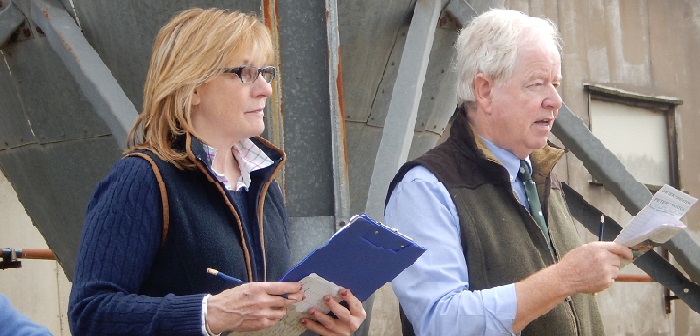Very little good news to report once again and in horse racing terms, the going for the pig industry is currently very heavy.
The SPP dropped another 1.69p to 143.05p due to poor demand and strong competition from cheap imported pig meat with, for example, the German producer price quoted at 1.19 EUR, which in our money is little more than 105p/kg.
Weekly contribution prices continue to decline with some back by a further 2p and others standing on, with most between 132p and 134p. The Euro traded little changed at 89p.
Reports of some abattoirs opting for Saturday kills might help to soak up some of the backlog of live pigs in the system.
With most pigs sold under contract, spot demand is virtually non-existent and for those unlucky enough to have extra pigs to sell prices for one off loads of spot pigs have been reported in the 110p – 115p/kg range, although regular sellers should be able to negotiate deals of around 125p/kg.
The only slightly more positive news is that cull sow supplies have started to move across the Channel but in very restricted numbers and prices are initially unlikely to be much better than 35p/kg, which means that only big sows have a value of much more than £50 per head before deductions.
Cull sow prices continue to reflect the severe delays being experienced at Dover, Calais and the German Border where the effects of the new post-Brexit world we live in have led to long delays for meat exporters at the docks. This is due to the non-digitised documentation which has been described as not fit for purpose due to the mountain of paperwork, which has to accompany each consignment and be manually checked to ensure that all the i’s are dotted and the t’s are crossed to allow our pig meat to reach the EU markets, which used to be so readily available.
As a result, cull sow exporters have been under a huge amount of pressure to comply with the bureaucracy involved in pig meat exports, with cull sow export numbers restricted and several thousand building up on this side of the Channel to the detriment of Animal Welfare Standards and pig producers’ overdraft levels.
Although in some cases weaner prices appear not to be taking much harm, those producers with contracts soon up for review may have to take a deep breath when new pricing proposals are submitted by finishers, who bear the brunt of the recent increases in feed costs.
The AHDB are not currently publishing 7kg and 30kg average prices, but in general terms RSPCA Assured ex farm 7kg piglets are worth in the £37/head region with Red Tractor pigs £2-£4/head below this.
Commodity prices appear to have levelled to some extent after many weeks of increases with UK feed wheat traded at £216/t for February delivery and £168/t for September.
Barley prices are starting to catch up with wheat and February feed barley deals agreed at £175/t.
In the proteins department soya is still eye wateringly expensive at £440/t for February delivery.
UK feed wheat ex farm spot prices have been on the top side of £200/t and straw has been sold for as high as £120/t in places.
And finally, a learned economist once said the answer to financial prosperity for any country was to ‘export or die’.
Although much has been written and said about the near impossibility of exporting pig meat from the UK to the EU as a result of the ongoing customs delays, these rules urgently require replacement with reports of lorry loads of pig meat being held up through no fault of the operators and in some cases, delays have caused meat products to lose their fresh status and be disposed of for rendering.
On the other hand, the ease with which cheap pig meat imports seem to be able to penetrate the UK underlines the challenges which our pig industry has to face financially at a time when the whole pig supply chain is being torn apart by falling prices and competition with pork from other countries, often with lower welfare standards than ours, so more hard times lie ahead.




